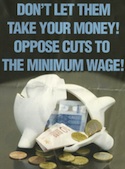
By eirigi
With last Friday’s passage of legislation to cut the minimum wage by 1 euro to 7.65 euro [£6.50], another shameful threshold was crossed by the Fianna Fáil-Green Party coalition; driving yet another section of society into poverty.
This despicable decision forces a 12 per cent reduction in the earnings of the lowest paid and, in many cases, the most vulnerable workers in the Twenty-Six County state, the majority of whom are not organised in trade unions. Those in full-time employment and being paid the minimum wage will be forced to survive on just €306 [£259] per week, a €40 [£34] reduction in their weekly gross income. In addition, the new so-called universal social charge, which is, in effect, a tax levy, will apply to all workers earning above €4,004 [£3,390] per annum.
Under the terms of the Blood Budget, all workers earning between €4,004 and €10,016 [£8,490] will face a universal ‘social’ charge of two per cent, while, for those earning between €10,016 and €16,016 [£13,570], there will be a four per cent charge on the balance. As a result, full time workers on the new minimum wage of €7.65, having already lost €2,080 [£1,760] per annum in gross income, face an additional loss of €436 [£370] through the imposition of the new universal tax.
Driving low paid workers deeper into poverty, we are told, is all in the interests of generating a ‘competitive’ economy and creating jobs. The ‘competitiveness’ mantra is trotted out systematically by establishment politicians, right-wing economists and IBEC representatives in an attempt to convince workers that pay cuts are actually in their interests.
A similar tactic was employed during the Lisbon Treaty debate when the same chancers insisted that Lisbon was essential for the creation of jobs. IBEC’s Brendan Butler was emphatic: “The Treaty provides a real opportunity to protect, support and create jobs in Ireland. A yes vote is vital for jobs and the economy.”
Since the passage of the second Lisbon Treaty in September 2009, there have been tens of thousands of job losses. Unemployment currently stands at 13.5 per cent, with 425,000 on the live register and tens of thousands more who have been forced to emigrate.
IBEC, an organisation with open access to Dublin government ministers, lobbied hard for the minimum wage reduction and, once granted, welcomed it as “an important step in bringing the Irish economy back into line with the rest of Europe. This needs to happen if we are to create new jobs and get people back to work.”
It is the same fallacious argument used to force through the second Lisbon Treaty. The wider agenda at play is to force down wage rates across the economy in the Twenty-Six Counties and bosses now have the dismantling of Registered Employment Agreements in their sights.
Laughably, we are told that those currently on the minimum wage have contracts of employment and will not face a cut to the new lower minimum wage rate; that it will apply only to those new entrants to the labour market. The majority of those on the minimum wage work in the catering, retail and construction sectors and are primarily migrant workers, women and young people.
A recent National Employment Rights Authority [NERA] inspection of over 850 catering businesses suggests otherwise and provides stark evidence of a blatant disregard for employment legislation and the rights of migrant workers in particular. NERA found that 76 per cent of the 850 businesses inspected were in breach of employment legislation, including failure to pay the statutory minimum wage; non-payment of over-time rates or Sunday premium rates, public holidays and holiday pay. In effect, there was systematic exploitation of migrant workers in the catering industry.
Meanwhile, the last available report from the Labour Relations Commission in 2008 indicated that, over a four year period, there was a significant increase in the number of cases taken under the Minimum Wage Act. Lack of trade union organisation in many of the sectors that pay just the minimum wage leaves many open to widespread exploitation.
Last Friday marked yet another shameful chapter in the sorry saga of Fianna Fáil-Green Party rule. Forcing tens of thousands into poverty, widening the gulf of inequality and protecting the interests of the rich will be the legacy of their time in government.
Dismantling this edifice brick by brick is the challenge facing all of us who believe another world is possible.
![[Irish Republican News]](https://republican-news.org/graphics/title_gifs/rn.gif)
![[Irish Republican News]](https://republican-news.org/graphics/title_gifs/harp.gif)

